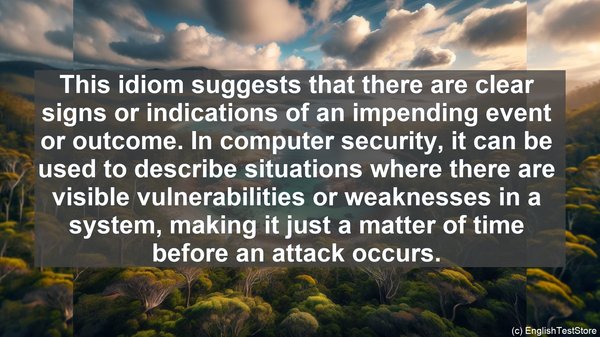1. ‘The weakest link’
As a computer security specialist, you’ll often hear this idiom. It means that the most vulnerable part of a system can compromise the entire security. For example, a single outdated software can be ‘the weakest link’ in an otherwise secure network.
2. ‘Lock and key’
This idiom refers to something that is highly secure. In computer security, it can be used to describe a system that has multiple layers of protection, making it almost impenetrable. For instance, a server with strict access controls and encryption can be said to be ‘locked and key’.

3. ‘Backdoor’
In computer security, a ‘backdoor’ refers to a hidden entry point in a system that bypasses the usual security measures. It can be intentionally created for authorized access or accidentally left behind, posing a significant threat to the system’s integrity.
4. ‘Red flag’
When something raises a ‘red flag’, it means it’s a warning sign or an indication of potential danger. In computer security, this idiom can be used to describe suspicious activities or anomalies that require immediate attention. For example, a sudden spike in network traffic can be a ‘red flag’ for a possible cyberattack.
5. ‘Tip of the iceberg’
This idiom implies that what you see or know is just a small part of a much larger and complex issue. In computer security, it can be used to describe the visible symptoms of a breach or an attack, while the underlying damage or extent of the threat remains hidden, like the ‘tip of the iceberg’.
6. ‘In the line of fire’
When you’re ‘in the line of fire’, it means you’re directly exposed to a danger or criticism. In computer security, this idiom can be used to describe someone who is responsible for handling and mitigating the consequences of a breach or an incident, like a security analyst or a response team.
7. ‘On the front lines’
Similar to the previous idiom, ‘on the front lines’ refers to being at the forefront of a battle or a critical situation. In computer security, it can be used to describe individuals or teams who are actively defending a network or system from potential threats, like ethical hackers or security administrators.
8. ‘Playing with fire’
When you’re ‘playing with fire’, it means you’re engaging in a risky or dangerous activity. In computer security, this idiom can be used to caution against actions like disabling security features, ignoring updates, or using weak passwords, which can potentially lead to a breach or compromise.

9. ‘The writing on the wall’
This idiom suggests that there are clear signs or indications of an impending event or outcome. In computer security, it can be used to describe situations where there are visible vulnerabilities or weaknesses in a system, making it just a matter of time before an attack occurs.
10. ‘A double-edged sword’
When something is ‘a double-edged sword’, it means it has both advantages and disadvantages. In computer security, this idiom can be used to describe technologies or practices that, while beneficial in some aspects, may also introduce new risks or challenges. For example, the widespread use of cloud services can enhance collaboration but also raise concerns about data privacy and security.
